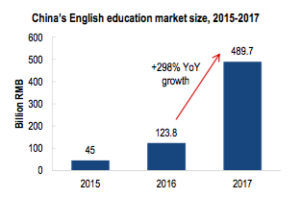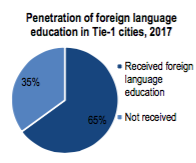China’s English education rising rapidly

English teachers in China are very much in demand as language schools struggle to keep up with the growing English education consumption. Just over the period of a year, from 2016 to 2017, there was a 298% growth from 123.6 billion RMB to 489.7 billion RMB in the English Education market in China. English consumption is especially growing in tier 1 cities with Shanghai, Beijing, Shenzhen and Guangzhou driving the market with the largest populations and GDPs in China. This is with an English penetration rate of 65%. This means that more than half of the citizens in these cities in 2017 received extra foreign education outside of school with 86.5% of this learning being focused on the English language. Further, China’s English education market size is estimated to reach almost double of the figures in 2017, reaching 947 billion RMB in 2019.
 |  |
Demand higher than the number of English teachers in the Chinese market

There are an estimated 100,000 English teachers needed in China which are expected to increase further over the next few years. This consumption of English is important as English class is compulsory in China’s primary schools from their third year for a period of four years, middle school for a period of six years as well as in the first two years of university. This adds up to more than 2,000 hours studying English which is more than any other course. As a result, 60% of English teachers in Primary schools in China teach more than 50 students in one class and 90% of middle schools teach more than 40 students. This need to learn English has to lead to a large quantity of kindergarten and private schools now offering to teach English to young children in China. This is in order to start English education as early as possible as parents seek the best teachers in order for their children to begin school more competitively. Further, the slowing down economy has increased the need for children to get the best education in order to get jobs. Consequently, many places hiring English teachers are raising salaries, offering more benefits and following regulations in order to lure teachers away from Japan and South Korea to cater to this demand.
Requirements for teaching English in China: Chinese parents as drivers of English language
Parents are very particular about their children’s English teachers in China as they look for highly skilled and experienced tutors and value their children’s view of their teachers. North American Teachers are particularly in demand from Chinese parents. This is as parents believe that North Americans have good pronunciation and lively teaching method styles which will help keep their children engaged. Moreover, many parents hope their children will study in the US or Canada in the future.

Further, the nationality of the teacher, that is, whether or not they are from a popular English speaking country is important to parents. This is as the type of English teacher they can afford is an indicator of social status. Consequently, hiring a foreigner is a privilege and gives them social status recognition from their peers. As a result, even though a skilled Chinese native is perfectly capable of teaching English, parents still prefer foreigners due to the social implications it has for them. Moreover, parents sometimes prefer an English teacher from a popular country, where English is their second language, such as Russia, over non-popular countries. As such, whilst parents place substantial weight on teachers’ skills and experience, along with their child’s opinion of the teacher, there is also a significant focus on the teacher’s nationality which is viewed as indicative of quality and social status.
English education consumption in China: What education expenditure Chinese parents are willing to bear
With parents as the drivers of demand, they are very willing to spend a substantial amount of money on their children in order to allow them a better future. This is evident as 13 billion RMB is spent by Chinese parents yearly for education outside of school as a whole. As a result, a large amount of household income for families is spent on language classes for their children. This is evident as 73% of parents surveyed revealed that they spent at least 10,000 RMB, that is 1,580 US dollars, on English classes per year. As the Chinese market, consumer segmentation is currently shifting from adults to young children as parents are spending more on their children’s education instead of their own.

This is as parents mainly only need to learn English due to professional requirements of their job which necessitates them improving their English skills or their want to learn English in order to reach new career goals or improve their personal life. Other reasons may include an aim to become a Chinese teacher, for a promotion, the improvement of skills for future career development, for the improvement of social status, for business travel or a long-term transfer abroad or for personal comfort when traveling abroad. However, many adults in these categories do not have or have few family expenses and are likely single unless they are studying for necessity. This is as families main concern is on their children’s education in order to give them the best start in life. Further, this trend can be seen in that ESL (English as a Second Language) schools were first created to teach English to adults, but as demand has shifted towards children, educators and schools have adapted their teaching methods and systems accordingly.
Segmentation of English education in the Chinese market
Within China, there are two kinds of channels, that is schools and companies. Schools are broken up into international schools, public schools and universities where companies are separated into offline and online. This is with foreign English teachers mainly working in international schools and English training companies.
Chinese English training market: Main players
There are 0.3 billion consumers in the Chinese English training market and more than 50,000 English training institutions. As English language providers enjoy this robust demand, there is still a need to stay competitive. This is evident with providers such as Alo7 leveraging their knowledge in order to help regional companies who are competitive in their teaching content but who lack large tech departments. This company specializes in AI for computerized adaptive assessment testing and aids companies who want to get ahead of rival language providers. Another way of staying competitive, however, is the range of offerings a company has in terms of the ages classes are open to and class groupings. This is with many organizations choosing to focus on young children but who also may provide services to adults who need to improve their English.
An international school targeting children is Children’s Tales International Kindergarten which aims its programs at 2 to 6-year-old children in classes of 20 to 25 students depending on the level of the child. The school uses assistant teachers from English speaking countries with teaching experience in Kindergarten in their home country and teaching English as a second language. The school is located in Beijing and Chengdu and its’ focus on children is a major selling point with it being so in demand.
In terms of Private language schools in China, there are three main companies that do English tutoring. The first of which is Wall Street English which conducts one-to-one lessons or small classes in person, online, at home or at the private school itself. The company hires foreign teachers from native speaking countries and with 70 schools across 11 cities, the international organization is famous for English Teaching. In comparison, Shanghai Bell Language school hires native teachers from the UK and operates in Shanghai and Beijing with English Language school headquarters in the UK. Learning Education School also hires native English speakers from English speaking countries with a focus on children from ages 3 to 16.
In regards to online language schools, there are two main companies that teach English in the Chinese market. These are Itutorgroup and Landmark Education. Itutorgroup hires foreign teachers from native speaking countries and is able to provide its services online throughout China. Its teaching structure consists of small classes or one-to-one lessons for adults. Comparatively, Landmark Education hires native speakers of the English Language that are preferably fluent in Chinese in order to project its services all across China to children.
The truth about teaching English in China: Regulations for foreigners applying for English teaching jobs
Official regulations for foreigners applying for English teaching jobs in China are set out by the State Administration of Foreign Experts Affairs. This body requires that English teachers in China be between the age of 18 and 60 with a bachelor degree or above. Further, at least two years of experience is needed along with teaching English as a Second Language certificate with 100 to 120 hours of teaching experience. Additionally, if an applicant is a non-native English speaker, they need a bachelor degree with an English major or a master of education.
Teach English in China: Parents preferences in practice

Recruiters and organizations of teaching schools care very much about what parents want as they drive the demand. Therefore, factors such as teaching skills and experience, qualification certificates and teachers’ countries of origin that is whether they are from a native English speaking country, preferably a popular one, is very important to organizations. Additionally, organizations prefer those under 50 years old and those from the UK, Canada, Australia, New Zealand and the US.
Foreign English teachers recruitment across various channels in China
In China, the more popular the school, the more difficult the recruitment is. This is especially in order to comply with parental expectations about the education their children will receive. As a result, for English native teachers from less popular countries in China, finding a job in a prestigious international school can be difficult. This is as international schools have a very selective screening process for recruitment, starting with the nationality of teachers which can be a determining factor for parents in choosing schools. As such, companies are trying to make themselves more attractive employers in order to gain the more desired teachers. This is even in spite of organizations needing official qualifications from the government to employ foreign English teachers in China which can be difficult depending on the region.
| International school | Private language school | Online language school | |
| Benefits |
|
|
|
| Selection criteria |
|
|
|
| Job opportunity |
|
|
|
[Source: The table is developed by Daxue Consulting research team]
Moreover, language schools in the Private education sector in China are also highly motivated to continuously improve in order to charge higher tuition fees and attract high-quality students. This is with most private schools using student information and human resource systems in order to track student progress and to recruit and train teachers. For less popular countries, in particular, the best channel for English tutors is private language schools, where conditions are good and recruitment is based on certificates and experience, or international schools from smaller cities such as tier 2 or 3, where competition is less important. Further, universities and private language schools have higher criteria when recruiting foreign English teachers in China but with less preference towards nationality.
Online channels are also growing rapidly with Online English training companies attracting 1.8 billion RMB of investment in 2017. There are three companies that claim that they have more than 10,000 foreign English tutors, which are Tutorabc, 51talk and Dada. By running their business online, it allows these companies to extend their business across China instead of concentrating on singular specific areas.
Case study: Barbados
Barbados is an example of a place that has limited popularity and awareness within China. The Chinese population who look it up are mostly looking for basic information about Barbados such as finding out more about the country or looking up terms which have something to do with the country. There are 605 average daily requests with the searches coming from mostly tier 1 cities who want to learn about other countries. These search terms, however, are only limited to the country itself and tourism, not the native English speakers themselves who can teach their children. Further, in terms of this awareness, Barbados is in the middle range of smaller English speaking countries. This is only limited to the country itself and tourism, not the native English speakers themselves who can teach their children. Therefore, in order to aid teachers coming from Barbados, experience and qualifications of tutors must be clearly highlighted as well as the English history of the country.
Further, there is a phenomenon in the Chinese market called the group effect. This effect has lead to Chinese parents accepting tutors from Russia and the Philippines and has a positive influence on any nationality. For it to be enacted, an influx of a single nationality is needed in order to develop awareness among parents. Therefore, if a company wanted to enter the Chinese market with teachers from Barbados, a large concentration of Barbados teachers would be needed to gain acceptance from Chinese parents. This is as awareness is needed by the Chinese community in order to establish the county’s popularity. This is needed before parents will decide whether or not they want to use their services based on the social implications it can have for them.
Clearly, however, famous English speaking countries have larger search requests when compared to smaller English speaking countries. This is seen through the ranking of Baidu, the Chinese search engine equivalent of Google, which ranked the requests for English-speaking countries in the past 6 months. Not surprisingly the US was at the top, followed by the UK, Australia, Antigua and Barbuda, Bahamas, Dominican Republic and Saint Lucia.
Opportunities for teaching organizations of popular and non-popular countries in China
The Chinese English Training Market is far from saturation- the high demand for English teachers from English native countries is a good opportunity for many countries whether or not they are popular. This combined with the economic growth in China has driven consumption of education. More expensive foreign English tutors are becoming more affordable for Chinese parents and adult students. Teaching English to children has become a flourishing market, as education comes first in many households to ensure children have professional success. Therefore, staffing agencies that can provide and gather English teachers to existing Chinese English teaching institutions, expanding an overseas language group or even starting an English teaching school are expected to be profitable with the current demand for education.
Further, the group effect as mentioned can be beneficial to any nationality if done correctly. This is evident as the influx of English teachers from Russia and the Philippines has made those teachers acceptable to parents and are sometimes preferable to Chinese teachers. Those wanting to enter the market, should target and send tutors to cities such as Shanghai, Beijing and Chengdu with a large group of teachers concentrated in these areas. This is in order to increase the awareness of the nationality of these tutors and their qualifications among the Chinese. Further, targeting private schools or international schools in smaller cities with less competition or aiming at places with an emphasis on qualifications and experience over nationality. Additionally, working with private language schools with high recognition and that have a network within different cities such as Wall Street English would be a good driver to gain trust among the Chinese population. Most importantly, an organization needs to develop an awareness of the nationality of teachers to be entering and as such collaborating with other industries will help spread awareness and knowledge of an English teacher’s skills and proficiencies. This, however, depends on what positioning an organization wants to enter at and as such advice is suggested before embarking in China.
Featured Image from Ling-App.





